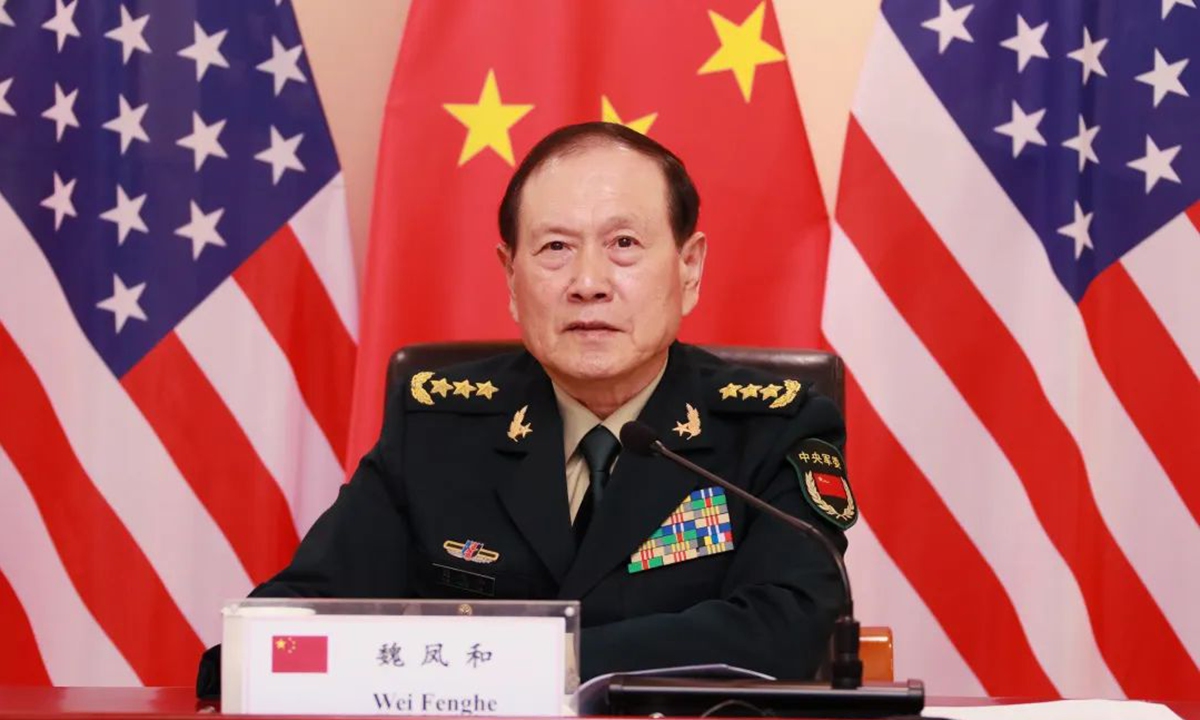Chinese defense chief to expound on security at Shangri-La Dialogue as US pushes ‘Indo-Pacific’

Chinese State Councilor and Defense Minister Wei Fenghe
After being cancelled for two years due to the COVID-19 pandemic, the International Institute for Strategic Studies (IISS) 19th Shangri-La Dialogue is scheduled to take place in Singapore from Friday to Sunday, with the world focusing on the in-person speeches to be delivered by US Secretary of Defense Lloyd Austin on June 11 and by Chinese State Councilor and Defense Minister Wei Fenghe on June 12, as well as whether the defense chiefs of the two countries would hold a meeting there.
Analysts said they would not be surprised if Austin would continue to peddle the "China-threat theory" and underline the so-called Indo-Pacific Strategy there aimed at mobilizing regional actors to take sides and form an anti-China clique in the Asia-Pacific region.
Wei started his trip to Singapore on Wednesday to attend the dialogue and visit the country, and he will speak on "China's vision on regional order" in which he will discuss China's policies, ideas and concrete actions in practicing true multilateralism, safeguarding regional peace and stability, and promoting the development of a community of a shared future for mankind.
The US defense chief is also scheduled to deliver a speech on US defense policy, according to a release by the US Defense Department.
In the 2022 February edition of the US' Indo-Pacific Strategy, the US labeled China as the primary source of challenges that the region is facing, saying that China's "coercion and aggression spans the globe, but it is most acute in the Indo-Pacific." The US also stressed it would work with partners to maintain "peace and stability" in the Taiwan Straits, including by "supporting Taiwan's self-defense capabilities."
"It can be expected that Austin would elaborate on those security topics, which is to sell the China threat theory. Trying to turn the Taiwan question, China's domestic issue, into an international one is completely self-deceiving," Song Zhongping, a military expert and TV commentator, told the Global Times on Wednesday.
Wei Dongxu, a Beijing-based military expert, told the Global Times that by spreading fear especially over the South China Sea disputes, the US will attempt to convince and attract more countries, especially Southeast Asian countries, to create a quasi-alliance to channel its military deployment from the West Pacific, Indian Ocean and Oceania to the South China Sea.
However, countries like Singapore, Indonesia and Vietnam - although they agree to join military drills and purchase US weapons - will not give up their autonomy and military self-control like South Korea, let alone allow the US to deploy a permanent military presence on their soil, Wei commented.
Asia is not Europe where there is a significant conflict, and conflicts are not in line with the interests of regional countries.
"Many in Asia are clear and also worried that the US would bring about division and wars to the Asia-Pacific like it did in the Middle East and Europe. If Austin puts on full attack against China, Asian countries would become even more on alert. Given the US has been struggling to handle domestic issues such as inflation unseen in decades and rampant mass shootings, who would take the US security promise seriously?" said a scholar on international affairs on the condition of anonymity.
Tensions between Beijing and Washington have been simmering due to a series of US moves provoking China over the latter's core interests on the Taiwan question. That includes US Senator Tammy Duckworth's visit to the island of Taiwan at the end of May and also President Biden's remarks during his Asia trip that the US would militarily intervene in a potential conflict over Taiwan.
CNN cited a senior US defense official as saying that Austin is "set to" meet with Wei for the first time in Singapore, though there is no official announcement yet.
The CNN report said that the two have only spoken on the phone once on Aril 20, which was the first time a US defense secretary had spoken to his Chinese counterpart since Biden took office more than a year ago.
Their meeting, if it takes place, shall showcase a basic agreement on managing disputes and willingness to enhance communication, Song said, adding that on topics such as nonproliferation and responding to climate change, the two sides need to increase cooperation.
Photos
Related Stories
- Demonizing China becomes boring, prone to ridicule: Asia Times
- Expert: Lifting of tariffs will help US tackle inflation
- Interview: U.S.-China academic exchange has brought benefits to both sides, says American scholar
- Provocations by US, NZ should stop, Beijing says
- Feature: Chinese ambassador says China to continue to support Chinese language education in U.S.
Copyright © 2022 People's Daily Online. All Rights Reserved.









